On December 9
“Since early in 1945 the most powerful single force in promoting Communism everywhere, and in turning one nation after another over to Communist tyranny has been the help of the United States Government to that end. Today Moscow and Washington are, and for many years have been, but two hands of one body controlled by one brain.”
~ Robert H.W. Welch, Jr.
Founder of The John Birch Society
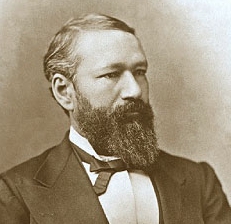
1872 – After impeachment charges were filed against Louisiana Governor Henry Clay Warmoth, state law required that Warmoth step aside until his impeachment case was tried.
On this date, acting Lieutenant Governor Pinckney Benton Stewart Pinchback – who had a white father and black mother – was sworn in as acting governor, making him the first person of African descent to govern a U.S. state.
Pinchback (shown above) served for about six weeks until the end of Warmoth’s term,

1907 – The U.S. Post Office in Wilmington, Delaware offered Christmas Seals for sale for the first time.
Contributions for the original seals, designed by Emily P. Bissell, helped in the fight against tuberculosis.

1911 – An explosion at the Cross Mountain Mine near Briceville, TN occurred when a roof collapsed near one of the mine’s entrances, releasing methane gas into the air.
The gas and coal dust ignited when a miner approached the entrance with an open lamp. The explosion trapped 89 miners who had gone into the mine that morning. 84 of them died. Fourteen pairs of brothers were killed. Five sets of fathers and sons were killed. Eleven of the 54 widows also lost their fathers and/or one or more brothers.
The last two bodies recovered were those of 22-year old Eugene Ault and Alonzo Wood. Ault managed to inscribe a farewell message on an inner barricade for his family before suffocating. His message read as follows:
Dear Father, Mother, Brothers, and Sisters, I guess I have come to die. Well I started out and I came back to side track, and Lonzo Wood is with me. Air is not much now. Will be good, and I aim to pray for God to save me and all of you. Tell Clarence (his brother) to wear my clothes out. Give him my trunk. I guess I will never be with you any more. Give Bessie Robbins (his girlfriend) a stick pin of mine. Tell her goodbye. So goodbye. Give them all my love.
E. Ault
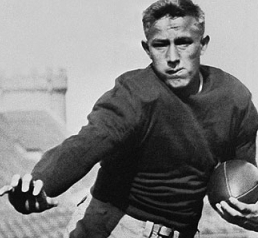
1935 – The Downtown Athletic Club Trophy, later renamed the Heisman Trophy, was awarded for the first time. The winner was halfback Jay Berwanger of the University of Chicago.
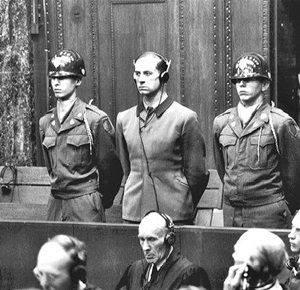
1946 – The Doctors’ Trials collectively known as the Subsequent Nuremberg Trials ( but formally the “Trials of War Criminals before the Nuremberg Military Tribunals”) began.
Twenty of the 23 defendants were medical doctors.
The Doctors’ Trials ran until August 20, 1947. Of the 23 defendants, seven were acquitted and seven received death sentences – including Karl Brandt (shown above), the personal physician to Adolf Hitler.
The remainder received prison sentences ranging from 10 years to life imprisonment.
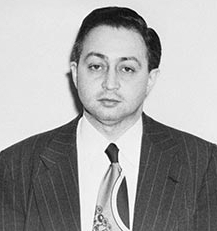
1950 – Harry Gold – who had confessed to serving as a courier between Klaus Fuchs, a British scientist who stole top-secret information on the atomic bomb, and Soviet agents – was sentenced to 30 years in jail for his crime.
Gold’s arrest and confession led to the arrest of David Greenglass, who then implicated his brother-in-law and sister, Julius and Ethel Rosenberg.
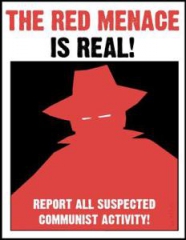
1953 – General Electric announced all Communist employees would be fired, and further stated that anyone who refused to testify under oath “before a competent government authority” on their political affiliations would be suspended.
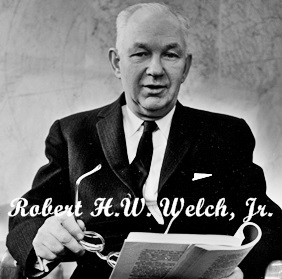
1958 – In Indianapolis, retired Boston candy manufacturer Robert H.W. Welch, Jr., established the John Birch Society, a right-wing organization dedicated to fighting what it perceived to be the extensive infiltration of communism into American society.
The John Birch Society, initially founded with only 11 members, had by the early 1960s, grown to a membership of nearly 100,000 Americans and received annual private contributions of several million dollars.
The society revived the spirit of McCarthyism, claiming in unsubstantiated accusations that a vast communist conspiracy existed within the U.S. government. Among others, the organization implicated President Dwight Eisenhower and Supreme Court Chief Justice Earl Warren.

1965 – A Charlie Brown Christmas premiered on CBS.
Although everyone involved with the making of the special thought it was going to bomb, it was viewed by 45% of those watching television that evening, and has been aired during the Christmas season traditionally every year since its premiere.
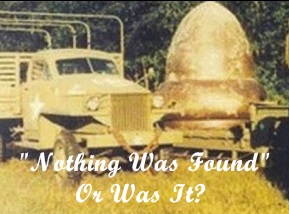
1965 – A large, brilliant fireball was seen by thousands in at least six U.S. states and Ontario, Canada.
It streaked over the Detroit, Michigan/Windsor, Ontario area, reportedly dropping hot metal debris over Michigan and northern Ohio, starting grass fires and caused sonic booms in Western Pennsylvania.
It was generally assumed and reported by the press to be a meteor after authorities discounted other proposed explanations such as a plane crash, errant missile test, or reentering satellite debris.
The area where the object landed was immediately sealed off on the order of U.S. Army and State Police officials, reportedly in anticipation of a “close inspection” of whatever may have fallen Speculation ranged from a UFO to debris from Kosmos 96, a Russian satellite that had crashed on re-entry.
U.S. Space Command concluded that Kosmos 96 had crashed in Canada about 13 hours before the fireball was seen and insisted that “whatever fell from the sky, if anything fell at all,” had nothing to with Kosmos 96.
In December 2005, just before the 40th anniversary of the Kecksburg crash, NASA released a statement to the effect that they had examined metallic fragments from the object and now claimed it was from a re-entering “Russian satellite”.
The spokesman further claimed that the related records had been “misplaced.”
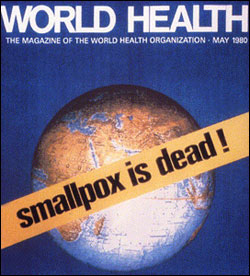
1979 – A global commission certified that smallpox had been eradicated. The certification was officially accepted by the 33rd World Health Assembly in 1980.
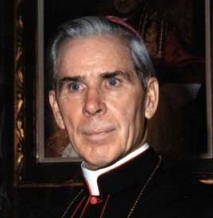
1979 – Bishop Fulton J. Sheen died of heart disease at the age of 84.
He was best known for his work on television; Life Is Worth Living and The Fulton Sheen Program.
He was buried in the crypt of St. Patrick’s Cathedral.
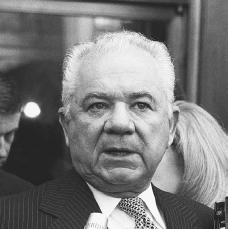
1982 – Leon Jaworski, the second special prosecutor during the Watergate Scandal after the dismissal of his predecessor, Archibald Cox, died at the age of 77.

1983 – U.S. Attorney General Edwin Meese created a storm of controversy with his responses to questions about hunger in America.
In response to a question about balancing spending cuts against the need to feed hungry children, Meese said that he hadn’t seen “authoritative” evidence that children in America were going hungry and that some of the allegations of this “are purely political.”
When asked about soup kitchens, he said that “some people are going to soup kitchens voluntarily. I know we’ve had considerable information that people go to soup kitchens because the food is free and that that’s easier than paying for it.”
Democratic leaders and social welfare activists called his comments “disgraceful” and “an outrage.”

1983 – Scarface, starring Al Pacino as a Cuban refugee who becomes a Miami crime boss, premiered.
The film was loosely based on a 1932 gangster film of the same name. While it received mixed reviews upon its initial release and was criticized for its violence, it proved to be a success at the box-office and went on to achieve pop-culture status.

1990 – Lech Walęsa defeated Prime Minister Mazowiecki and other candidates to become the first democratically elected President of Poland.
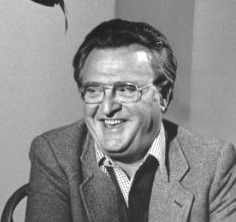
1992 – Actor Vincent Gardenia died of a heart attack at the age of 72.
He starred in Death Wish, Little Shop Of Horrors, The Hustler, Heaven Can Wait, All In The Family, and was twice nominated for an Academy Award for Best Supporting Actor: Bang The Drum Slowly and Moonstruck.

1992 – British Prime Minister John Major announced the formal separation of Charles, Prince of Wales and heir to the British throne, and his wife, Princess Diana.
Major explained that the royal couple had separated “amicably.”
The report came after several years of speculation by the tabloid press that the marriage was in peril, citing evidence that Diana and Charles spent vacations apart and official visits in separate rooms.
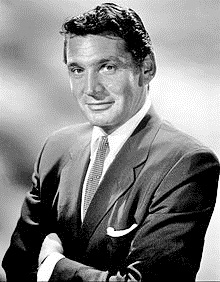
2009 – Actor Gene Barry died of natural causes at the age of 90.
He is best remembered for his leading roles in the films The Atomic City and The War Of The Worlds and for his portrayal of the title characters in the television series Bat Masterson and Burke’s Law.

2014 – Mary Ann Mobley died from breast cancer at the age of 77.
She was featured in Harum Scarum, Burke’s Law and Diff’rent Strokes, but is best known as the winner of the Miss America pageant in 1959.
Compiled by Ray Lemire ©2023 RayLemire.com / Streamingoldies. All Rights Reserved.